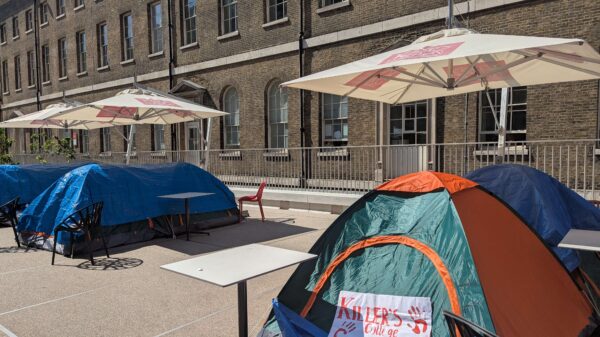Roar writer Cristiana Sandeva interviews WeJam’s founder David Tshulak in a conversation about his innovative start-up, music and dedication.
WeJam is a brand new project launching on 1 October. It could be described as an inverse karaoke experience, where the only backing track are the vocals, while everything else is played live by the band. As all bands, WeJam’s band is made up of the up-to-six people in the recording studio – the new and cool feature about it is that literally any solo shower-performer can be a lead guitarist! Roar had a chat with WeJam’s young founder David Tshulak, and we got to discuss the project, entrepreneurship and future hopes in unpredictable present times.Â
Roar: David, you’ve worked in big corporate media companies for most of your career. What made you turn the page and start off as your own manager in the sector?
David: Well, I had this idea a couple of years ago, while I was working in TV and noticed no such thing existed. The WeJam project kind of brought together all of my passions: I studied music, I have been an active musician my whole life and I started taking this passion more seriously around two years ago. I decided to step out of the comfort zone and I made a prototype. I got some people to test it and the positive feedback I received made me think, “Okay, maybe we should actually do this!â€. I then started working on it full-time and focused on building the tech that makes the whole thing function, and now here we are, ready to launch this week!
R: Congratulations! So how do you feel about the upcoming launch? Of course you could not expect Covid-19 when you started working on WeJam two years ago, so how do you think the business might be affected?
D: One could easily fall into despair, but I actually think we are still lucky in a number of ways. One good thing is that a band almost always naturally follows the “rule of six†that’s in place right now, so our bookings and gatherings will fortunately not be affected by that. The other good thing is that the project is mobile, so we can easily switch locations depending on where demand is coming from. We are now starting off in Central London, but that is flexible and adaptable to circumstances. And ultimately, I do believe people just want the social and human connection back, especially if it is possible to experience it again in a safe way. As we come out of this, people are going to be looking for ways to reconnect with fellows, be it through corporate team-building activities, groups of students, even families. This is something all ages can enjoy, and it works well with all levels, from total beginners to advanced players.
R: This brings me to something I was struck by when looking at your website earlier. How does this magic happen? How does a total beginner who has never held an instrument in their hands suddenly get stage-ready in only sixty minutes?
D: Good question. So if you have ever watched a hip-hop artist going up on stage and pressing buttons and triggering samples, you could see it as something similar to that principle. The difference is that, rather than hitting a drum machine, you are playing chords on a keyboard and that is triggering something more complicated. For a complete beginner, they would play a very simple part, for instance one note every four beats they have to play. That would then trigger something more elaborate: a chord, a bass riff, a melody. That is a rough principle of how it works. The human factor is also crucial: people in the studio are never abandoned to their destiny. Every session is led by a facilitator, that’s called a “roadieâ€, who runs the sessions – they will show you what to do, advise you and, of course, entertain you. It’s a fun and interactive social experience, after all.
R: Did you develop this whole thing on your own? How did you manage to pick and adapt all songs? And how did you select your roadies?
D: We are a team actually, albeit a small one. It’s three technicians who have been working with me in the past year and some musicians and songwriters who have helped adapt the songs that are going to be played in the studio. As for the roadies, we have been looking for people with a “natural musicality†and who had had first-hand experience playing in a band, rather than just book-smart musicians. For the roughly thousand songs we have selected so far, we tend to first go for ones that were ranked first in karaoke and “best-of†charts. We also tried not to pick tunes with repetitive melodies, as that would have made the WeJam experience less entertaining than it can get. We have made sure that we have songs from every genre, every decade and which are suitable for all different group sizes. We want the outcome to be an accurate rendition of the original, but also fun to play at the same time.
R: Do you think your previous media career shaped the way you approached your new initiative?
D: Definitely! Working in the media really trains you to create drama and tension to capture the spectator’s attention. We applied this principle here as well: we have made sure every player has a “tricky†bit to play throughout the performance, which builds up thrill and excitement in each member during the whole time that they are practising and perfecting their part.
R: How do you hope this project is going to evolve in the near and maybe even further future? How do you expect the first sessions to be?
D: As of now, we are focused on proving this concept in London, and then why not allow ourselves to hope it could expand internationally. Music is a universal language, and if you look at how popular something like karaoke has become, I think that there is no reason why we shouldn’t hope to expand WeJam to other major towns in the future.
For now, we want to mainly focus on making sure that people are having fun. Most of the bookings we have gotten so far have been from young professionals, but in the future we are also hope to bring together students, companies and children. It would be quite hard to find someone who would not enjoy that!
R: I really hope that it all goes smoothly! Last but not least, what is a piece of advice you would give to young folks whose heads bubble with fresh ideas, but who may be wavering to take their first entrepreneurial steps?
D: Well, to begin with, be assured that starting a business has never been easier historically than now. Especially if there is some element in which tech is involved, you can make things happen easily as a self-starter and develop them at almost costless rates. As a student, you even already have access to people who could potentially test your products. You just create an MVP, test if the idea works, and then decide upon any further steps you might want to take. And then it just sort of all fits into place with time. Two years ago we were working on a WeJam prototype, and now here we are ready for launch on Thursday!
Ultimately, if I had to give young folks one motivational sentence that I tend to go by very often when I need a pick-me-up, it would be: “people that are in the right place at the right time have been in many places at many times†– which basically means “get out there and grasp as many opportunities as you can, you will find the right fit for you eventually.â€
So if you are willing to dive into a new and safe experience in a hip studio in central London, travel through time and play music from your favourite era with your favourite people, hit up WeJam (and their first-month soft launch at 50% off)! Also know that David would be more than glad to hear from you if you think you could be a good roadie, so don’t feel shy about sending him a message.
Check out their website here to learn more about the project.
















